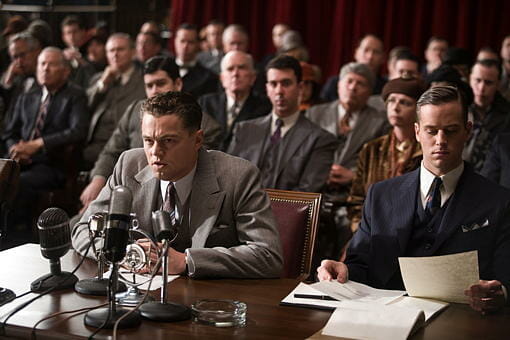By Jim Rohner · November 14, 2011

Almost 40 years after his death, J. Edgar Hoover still remains one of the most controversial and polarizing figures in American history. Like most leaders that basked in such prominence, Hoover has his defenders and his detractors with both of whom, I'd imagine, having to rely on healthy amounts of subjectivity to speculate on the many blanks left by the country's imposing yet secretive first director of the FBI.
Each side of the argument has more than enough ammunition to fuel their fight. Under Hoover, the FBI rose to prominence to become the expansive and efficient crime-fighting agency it is today, spearheading such innovations as centralized fingerprinting and forensic laboratories. On the other hand, he was often accused of exceeding the FBI's jurisdiction to harass political dissenters and activists. It was said he amassed secret files on many significant political figures, but to this day, very little has been found to confirm the charges. On a personal level, he was often accused of being a closeted homosexual and frequent cross-dresser with rumors circulating that his associate director and heir, Clyde Tolson, was his lover. But many woman, including Ginger Rogers' socialite mother, Lela, with whom Hoover was frequently spotted, would disagree.
Relatively little is known about the man, whose thorough and clinical approach to his work seems to have been an extension of his airtight personal life. What could've possibly happened in this man's life that his quest for his version of justice became so consuming? What did this man value, what did he detest and why? How is it possible that the assertions of his sexual preferences could be so dichotomous yet assured? We can only speculate. Luckily, two of those people speculating with us are writer Dustin Lance Black and director Clint Eastwood.
J. Edgaris framed as a series of stories the elderly Edgar (Leonardo DiCaprio) recalls to a revolving door of biographers in the days leading up to Richard Nixon's election. Through proper and deliberate diction, Edgar recounts the bullet points of a career and life that led him to become the first director of the Bureau of Investigation, which would later become named the Federal Bureau of Investigation. Edgar, his tone laced with self-assurance, ignores the social, moral and ethical implications of his actions as he tells of his unsuccessful courtship of Helen Gandy (Naomi Watts), who would become his personal assistant and lifelong confidant, the accumulation of wiretap evidence and personal files on political figures to which only he had access and the successful arrest and conviction of Bruno Hauptmann (Damon Herriman), who may or may not have had a hand in the kidnapping of the Lindbergh baby.
Yet interspersed with these flashbacks are moments of true shame and intimacy; moments that we assume nobody would ever willingly admit to his or her biographer. For instance, during a weekend getaway with Tolson (Armie Hammer), his associate director and rumored lover, a fist fight erupts after Edgar shuts out Tolson's advances – and, we're meant to assume, Edgar's own affections – by introducing the prospect of marrying a female socialite. One must also imagine how willing Edgar would be to divulge that he adorned the dress and pearl necklace of his mother (Judi Dench) shortly after her death. How do these events factor into the life of the man who waged a decades-long campaign against homosexuals in government? Could any of this have actually happened?
That's where the brilliance of J. Edgar comes into play. Neither Eastwood nor Black are privy to any more information on Hoover that is not readily available to us, but by weaving together the facts with the speculation they've crafted an entirely plausible deduction of both the cause of his behavior and its effect on his life. The filmmakers may not necessarily be purporting that their version of events is true, but they've started with the final product – that of a man constantly distrustful of the loyalties around him – and have worked backwards to form an equation – that of a man disloyal to his own affections – to help it add up logically.
What results is the story of dichotomies: the smiles and affections of a possible lover contrasted against the accusatory stares of a homophobic mother; personal desires vs. a public persona; professional advancement compensating for internal shortcomings. Even Tom Stern's cinematography, with its heavy shadows contrasting bleached out whites, signifies that a cloud has hung over Edgar's entire life.
Sure, the history books can confirm or deny narratives to a certain degree, but the past is written by those who win. Doesn't serving for 48 years through 8 presidents imply that Edgar won to a certain degree? The past, or at least, the past laid out in J. Edgar, is, after all, constructed through the words from his own mouth. How can we therefore possibly accept everything that's said at face value?